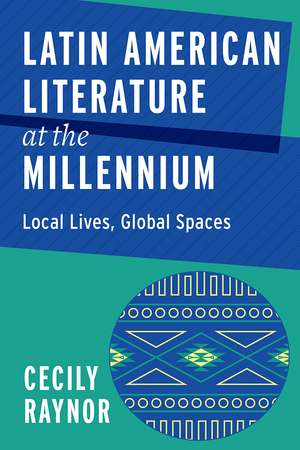Latin American Literature at the Millennium: Local Lives, Global Spaces: Bucknell Studies in Latin American Literature and Theory
Autor Cecily Raynoren Limba Engleză Paperback – 16 apr 2021
Preț: 320.80 lei
Nou
Puncte Express: 481
Preț estimativ în valută:
61.40€ • 63.86$ • 51.45£
61.40€ • 63.86$ • 51.45£
Carte indisponibilă temporar
Doresc să fiu notificat când acest titlu va fi disponibil:
Se trimite...
Preluare comenzi: 021 569.72.76
Specificații
ISBN-13: 9781684482566
ISBN-10: 1684482569
Pagini: 190
Ilustrații: 9 color images
Dimensiuni: 152 x 229 x 15 mm
Greutate: 0 kg
Editura: Bucknell University Press
Colecția Bucknell University Press
Seria Bucknell Studies in Latin American Literature and Theory
ISBN-10: 1684482569
Pagini: 190
Ilustrații: 9 color images
Dimensiuni: 152 x 229 x 15 mm
Greutate: 0 kg
Editura: Bucknell University Press
Colecția Bucknell University Press
Seria Bucknell Studies in Latin American Literature and Theory
Notă biografică
CECILY RAYNOR is an assistant professor of Hispanic studies and digital humanities at McGill University in Montreal.
Cuprins
Introduction: Patterning the Local within the Global
1 Migration Chronotopes: Imagining Time and Space in Two Brazilian Novels
2 Speed Control: The Politics of Mobility in Roberto Bolaño’s 2666 and Its Theatrical Adaptation by Àlex Rigola
3 Ambivalent Spaces: Allegories of Ruin in Bernardo Carvalho’s Teatro and Gilberto Noll’s Harmada
4 Another City and Another Life: Writing Multitudes in Valeria Luiselli’s Los ingrávidos
Conclusion: Ser de un interval
Appendix: Testing Regionalism, Migrant Narratives, and the Construction of Brazil: An Interview with Luiz Ruffato
Acknowledgments
Notes
Bibliography
Index
1 Migration Chronotopes: Imagining Time and Space in Two Brazilian Novels
2 Speed Control: The Politics of Mobility in Roberto Bolaño’s 2666 and Its Theatrical Adaptation by Àlex Rigola
3 Ambivalent Spaces: Allegories of Ruin in Bernardo Carvalho’s Teatro and Gilberto Noll’s Harmada
4 Another City and Another Life: Writing Multitudes in Valeria Luiselli’s Los ingrávidos
Conclusion: Ser de un interval
Appendix: Testing Regionalism, Migrant Narratives, and the Construction of Brazil: An Interview with Luiz Ruffato
Acknowledgments
Notes
Bibliography
Index
Recenzii
“A major contribution to the study of the aesthetics and material practices of literature in Latin America today. Engaging with the Hispanophone and the Lusophone world, Raynor provides a useful account of questions of space, mobility and globalization. Compelling in its new readings of Latin American authors that have redefined literary writing in Spanish and Portuguese: Bolaño, Luiselli, Ruffato, Noll, among others.”
"Uneven experiences of globalization in Spanish America and Brazil—as captured in turn-of-the-twenty-first-century cultural production—are the focus of Latin American Literature at the Millennium. With rich documentation and textured close readings, Raynor breathes new life into discussions on migration, acceleration, spaciality and the multitude. Through its chapters, the travails of local spaces in an integrated world come to bear on the literary historiography of the region."
"Local Lives, Global Spaces outlines the relationship between globalization and literature in Latin America, offering a key contribution to an exciting, emerging field. Critics and scholars working in the fields of Spanish American and Brazilian literature, narrative theory, and contemporary fiction will also benefit from this book."
"Dr. Raynor’s book approaches globalization from an unexpected and little explored angle. Through detailed textual analysis, careful contextualization of literary works, and perspicacious dialogue with critical works, Dr. Raynor shows how Latin American literature questions entrenched (though not immutable) dynamics of power and, thereby proposes other ways of understanding not only the region’s cultural production, but also how we understand the role that world literature plays in interrogating relations of political and cultural power."
"Specialists on the Latin American novel and those with an interest in Brazilian literature constitute the primary audience for this book."
"This book will be a valuable resource to students and scholars of Latin American fiction."
Descriere
Latin American Literature at the Millennium studies canonical and peripheral literary texts that complicate links between locality and geographical place, revealing new configurations of the local. It explores the region’s transition into the twenty-first century and evaluates Latin American authors’ reconciliation of conflicting forces in their construction of everyday places and modes of belonging.






